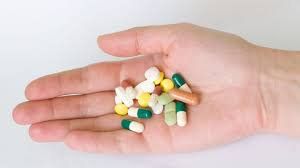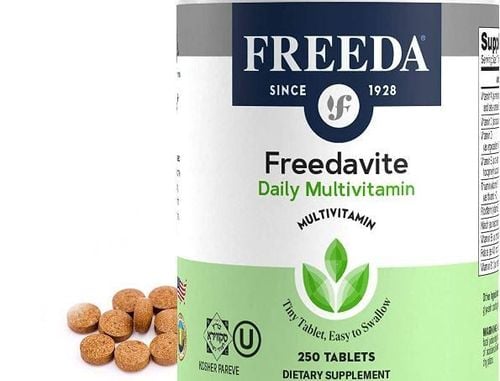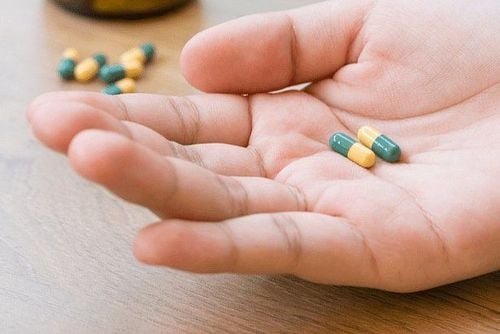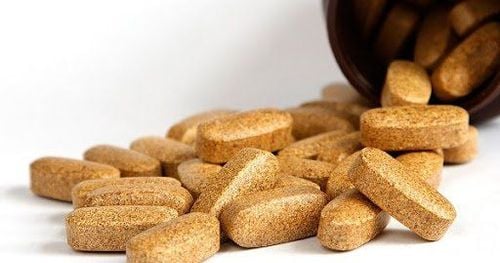This is an automatically translated article.
Animal chew medicine containing multivitamins is used in cases of vitamin deficiency, people after getting sick, pregnant women,... Pay attention not to use multivitamins more than the recommended dosage.
1. Uses of the drug Animal chew
Animal chew is a multivitamin product used to treat or prevent vitamin deficiencies caused by poor diet, certain diseases or vitamin supplements during pregnancy. Vitamins are organic compounds that exist in the body, although only in small amounts, vitamins play an important role in maintaining life as well as living activities of the body. Most vitamins cannot be synthesized by the body, but must be obtained from outside through foods and supplements.Animal chew medicine is used as follows:
The drug is made in the form of chewable tablets. You take it by chewing thoroughly and swallowing, usually once daily or as directed. Follow all directions on the package label or use as directed by your doctor. Be careful not to take more multivitamin products than recommended. Use Animal medicine regularly to achieve the best effect. To help you remember, take your medicine at the same time of day.
2. Animal chew multivitamin side effects
When using Animal chew medicine, you may experience symptoms such as constipation, diarrhea, abdominal pain. These side effects are usually short-lived and go away as your body adapts to the medication. Tell your doctor right away if the above symptoms persist or get worse.
Serious allergic reactions to the multivitamin Animal chew are very rare, but the consequences are very serious and can be life-threatening. Therefore, seek medical help immediately if after taking this medicine you develop symptoms such as itching, rash, severe dizziness, difficulty breathing, swelling of the face, swelling of the tongue, swelling of the throat, etc.
The above are not all possible side effects of Animal chew. Contact your doctor or pharmacist if after taking this medicine you develop any of the symptoms not listed above.

Người bệnh có thể gặp tác dụng phụ như đau bụng sau khi dùng thuốc
3. Precautions when using Animal chew
Before taking Animal chew, tell your doctor or pharmacist if you have the following conditions:
Allergy to any ingredient of the medicine or any other allergies. Having a history of alcohol abuse, liver, intestinal, stomach problems, etc. Your doctor or pharmacist will adjust your prescription or medication instructions to suit your health condition.
Additional precautions when using Animal chew are:
Folic acid supplementation may interfere with certain tests that detect vitamin B12 deficiency. If your Animal chew medicine contains folic acid. Before use, tell your doctor if you have a vitamin B12 deficiency. Vitamin B12 deficiency, if not detected in time, can cause serious neurological complications. Animal chew may contain Aspartame. Talk to your doctor or pharmacist about the safe use of Animal chew if you have phenylketonuria or a medical condition that requires you to limit your intake of Aspartame. Before using this medicine, tell your doctor if you are pregnant.
4. Drug interactions
To avoid the risk of adverse interactions between concomitant medications, before taking Animal chew, tell your doctor or pharmacist about all medications you are taking. Do not use, change the dose, or stop taking any medication without your doctor's approval.
The interactions with the drug Animal chew should be noted are:
Avoid using the drug Animal chew with other vitamin and nutritional supplements because of the risk of excess vitamins and minerals. If your brand of Animal chew is using iron, avoid using Animal chew with bisphosphonates, levodopa, antacids, thyroid medications (such as Levothyroxine), some antibiotics (Tetracyclines, Quinolones). Ask your doctor or pharmacist for advice on the safe interval between medications. If the brand of Animal chew you are taking contains folic acid, tell your doctor or pharmacist if you take anti-seizure medicines (such as phenytoin,...). Animal chew may affect the results of some tests. Tell your doctor and laboratory staff that you are taking this medicine.

Người bệnh không nên dùng chung các loại thuốc cùng nhau khi chưa hỏi ý kiến bác sĩ
5. Some other notes when using Animal chew medicine
5.1. If you overdose on Animal chew, you may experience symptoms such as stomach pain, nausea, vomiting, and diarrhea. In more serious cases, you may experience fainting or difficulty breathing. Call 911 or get help to get to a medical facility.
5.2. What to do if you forget to take a dose of Animal chew? If you take Animal chew on a regular schedule and forget to take a dose, take it as soon as you remember. If it is almost time for your next dose, skip the missed dose and take the missed dose at the usual time. Do not double the dose to make up for the missed dose.
5.3. How to store Animal chew medicine Store Animal chew medicine at room temperature, from 15-30 degrees, away from direct light and high humidity. Do not store medicine in the bathroom, keep it out of reach of children and pets.
Taking the Animal chew multivitamin is not a substitute for a healthy diet. The best way to get enough vitamins and minerals is to eat a balanced diet with fruits, vegetables, whole grains and protein. Only take vitamin supplements for a certain time according to the instructions of the doctor, avoid abuse, prolonged use because of the risk of side effects due to excess vitamins.
Any questions that need to be answered by a specialist doctor as well as customers wishing to be examined and treated at Vinmec International General Hospital Please register for an online examination on the Website for the best service.
Please dial HOTLINE for more information or register for an appointment HERE. Download MyVinmec app to make appointments faster and to manage your bookings easily.
Reference source: webmd.com












